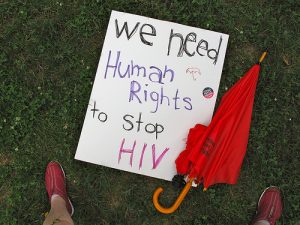
I have previously written about the global implementation of pre-exposure prophylaxis (PrEP) and how important it is to remove social and structural barriers to PrEP. On Tuesday, I drew attention to France and its challenges in viewing itself as a color-blind society and addressing the needs of migrants and communities of color. Today I am turning my attention to South Africa and the barriers that stop cisgender and transgender women and men, especially those engaged in sex work, from accessing PrEP, including violence, stigma, discrimination, and criminalization of sex work.
In November 2015, South Africa became only the third country and the first high HIV prevalence middle- or low-income country to approve tenofovir-emtricitabine (marketed in the United States as Truvada) for PrEP. On March 8, 2016, the Southern African HIV Clinicians Society released revised and expanded guidelines advising that PrEP is a highly effective and safe prevention option for HIV prevention that can be incorporated with combination prevention strategies. On March 11, 2016, the National Health Department and the South African National AIDS Council announced the National Sex Worker HIV Plan. The Plan is a comprehensive response to the needs of sex workers and includes the provision of PrEP and early treatment for sex workers. The targets of the Plan are:
- To reach 70000 sex workers with a core package of services;
- To recruit 1000 peer educators;
- To ensure that 95% of sex workers use condoms with their clients;
- To provide PrEP for 3000 sex workers (this target will be reviewed once the uptake is assessed in the first year);
- To ensure that 90% of sex workers reached are tested for HIV and know their status;
- To ensure that 90% of sex workers who test positive are on ART;
- To ensure that 90% of sex workers on ART are virally suppressed;
- To reduce instances of violence against sex workers by 50%.
The decision was made to start PrEP implementation with the most vulnerable groups. The National Health Department and SANAC’s Technical Working Group first developed implementation guidelines for PrEP rollout through existing service delivery platforms to sex workers, to be followed by guidelines for rollout to men who have sex with men (MSM) and to adolescents and young people. PrEP rollout to sex workers in South Africa commenced at 11 sites on June 1, 2016.
South Africa has set ambitious goals to reduce HIV infections and mortality among sex workers and to reduce human rights violations among sex workers. But any efforts to achieve these goals will fail unless the country can address structural drivers of HIV.
Sex workers face high levels of violence, stigma, discrimination, and criminalization. Perpetrators of violence against sex workers are not limited to their clients, intimate partners, or controllers. Sex workers also experience systemic harassment and abuse from law enforcement and members of the public. Police violence and harassment, including unlawful arrest, blackmail, and rape, is pervasive in the lives of sex workers. A study conducted among 300 sex workers in Cape town found that 70 percent has been subjected to police abuse, such as beatings, pepper spraying, and sexual assault. Fear of arrest and police violence also prevents sex workers from reporting such incidents.
Sex workers face violence because of discrimination based on gender, race, and other factors as well as because of stigma associated with sex work, which is criminalized in South Africa and many other countries. Criminalization itself has a direct impact on access to health care because it disrupts the ability of sex workers to remain in care and adhere to medication, including antiretroviral treatment or PrEP. Disruption is especially common with short stays in jails, with one study from the United States showing that 76% of jail detainees with HIV and multiple incarcerations had interruptions in their medications. Many individuals often cease to seek care for their medical conditions upon leaving jail or prison.
A recent study in the Lancet showed that decriminalization of sex work has the strongest effect on reducing HIV among sex workers. Decriminalizing sex work could prevent up to 46 percent of new HIV infections among sex workers – and their clients – in the next decade. Whereas criminalization of sex work has been shown to increase violence against sex workers and elevate their risk for HIV infection, decriminalizing sex work allows sex workers to speak up against violence and promotes access to health care.
PrEP has the potential to dramatically reduce HIV infections among sex workers, but implementation of PrEP will have limited impact if countries like South Africa criminalize sex work and do nothing to address the stigma, discrimination, and violence that sex workers experience. Effective HIV prevention for sex workers is not possible while sex workers operate illegally and remain vulnerable in the shadows.



